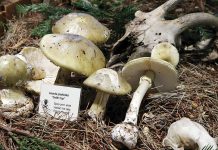The life and legacy of Cesar Chavez was celebrated with mariachis, an Aztec ceremonial dance and a moving speech by the late labor leader’s son, Paul, on April 2 at the first annual Cesar Chavez Day Breakfast in Gilroy.
Hosted by local nonprofit Community Agency for Resources, Advocacy, and Services (CARAS), the breakfast and fundraiser was one of a multitude of events held across the country in recognition of what would have been the civil rights leader’s 89th birthday.
Paul Chavez, one of Cesar and Helen Chavez’s eight children and president of the Cesar Chavez Foundation, told the gathering at Old City Hall restaurant that his father, even as he forged a social movement that resounded with people across the nation, was a normal person and would have been uncomfortable with all the attention.
“Actually, he would be uncomfortable today; he would want us to be out organizing,” he said.
Paul said it was his father’s personal experiences—working as a migrant farmworker and suffering from systemic racism while serving in the U.S. Navy—that informed his beliefs and compelled him to fight for social and economic justice, rather than any particular political ideology.
There was no political ideology, he said, it was personal.
Paul told of how his father, who grew up in a small town outside Yuma, Arizona, had to leave school to labor as a farmworker to help support his family, whose fortunes fell during the Great Depression.
The experience affected him so deeply that 40 years later, Cesar Chavez could point out to his son the orchards he had worked in or a particular bridge he had slept under while toiling in the fields.
“It’s this kind of upbringing that made him realize they needed more than a union, but a movement,” he said.
Cesar Chavez would go on to found the United Farm Workers Union with Dolores Huerta, who in her 80s continues to support labor causes, and lead a successful grape boycott that would bring farmworker issues to the awareness of mainstream America.
But, Paul said, for his father, the movement was never just about grapes and lettuce, it was about people.
Cesar Chavez went on to establish the first credit union for farmworkers and a cooperative gas station with a mechanic. He also created a burial fund.
Paul said his father wanted to address the needs and hopes of the community.
Twenty-three years after Cesar Chavez’s death, 11 states now honor his birthday as a holiday. The UFW call to action, “Si Se Puede,” is part of today’s political lexicon.
“I’m very proud and honored to see the memory of Cesar Chavez kept alive,” said Ernesto Olivares, a guest at the breakfast and officer of the Latino Family Fund, a project of the Gilroy Foundation. “We need to keep up the fight for social justice and farmworker rights as there are issues that still need to be addressed.”













